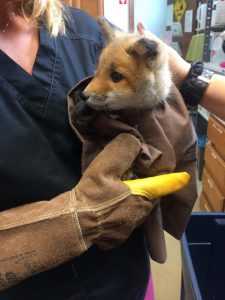
What is Mange
The disease affecting many of the Red Foxes in the Columbus area is Sarcoptic Mange. It is caused by a mite (Sarcoptes scabiei) that burrows through the skin causing intense irritation and itching which results in obsessive scratching and hair loss. Untreated, mange makes foxes vulnerable to a host of secondary infections and complications. This type of mange is treatable, but highly contagious to animals and humans.
Contributing Factors in the Mange Fox Outbreak
Incidents of mange in Red Foxes are on the rise and are likely linked to mild winters, habitat loss, and human encroachment. In residential areas like Dublin, foxes will often feed from the same human sources (trash, bird feeders, pet food dishes left outdoors) and share the same limited den space, contributing to the spread of highly-contagious mange.
Difficulties in Treating Mange Foxes
Ohio Wildlife Center has a strong success rate treating animals with mange, once in our care. The primary complication with treating the Red Foxes around Columbus is that even a very ill fox is incredibly difficult to catch. There’s a goo d reason that foxes are associated with speed and cunning. On several occasions, well-meaning people have chased a sick fox for hours trying to isolate and capture the animal. Their hearts were certainly in the right place, but this ultimately just stresses the animal and further threatens the fox’s health. When you see a fox suffering from mange, the best thing to do is to note its behavior and location and report the sighting to Ohio Wildlife Center’s InfoLine 614-734-WILD. The Center’s trained staff use humane havahart-style traps to safely contain foxes and transport them to our donor-funded Wildlife Hospital for care. Traps are baited and monitored daily. Once at the Hospital, we quarantine and treat infected foxes. Treatment difficulties include limited quarantine enclosures and the complication that only staff and volunteers who have been vaccinated for rabies can safely interact with the foxes. While large carnivores require significant space and resources, we are dedicated to our mission of raising awareness and appreciation for these animals by alleviating their suffering through expert care and treatment.
d reason that foxes are associated with speed and cunning. On several occasions, well-meaning people have chased a sick fox for hours trying to isolate and capture the animal. Their hearts were certainly in the right place, but this ultimately just stresses the animal and further threatens the fox’s health. When you see a fox suffering from mange, the best thing to do is to note its behavior and location and report the sighting to Ohio Wildlife Center’s InfoLine 614-734-WILD. The Center’s trained staff use humane havahart-style traps to safely contain foxes and transport them to our donor-funded Wildlife Hospital for care. Traps are baited and monitored daily. Once at the Hospital, we quarantine and treat infected foxes. Treatment difficulties include limited quarantine enclosures and the complication that only staff and volunteers who have been vaccinated for rabies can safely interact with the foxes. While large carnivores require significant space and resources, we are dedicated to our mission of raising awareness and appreciation for these animals by alleviating their suffering through expert care and treatment.
How Ohio Wildlife Center Helps Mange Foxes
Mange is successfully treated with medical intervention. After being assessed by our hospital’s veterinarian, mange foxes are placed in quarantine with nutritious food, water, and a safe, secure denning area. Often, the most urgent issues involve dehydration and emaciation. Compromised foxes typically have trouble finding adequate food and water. Appropriate medication is used to combat the mange and the secondary infections that often accompany it. You should never try to medicate foxes in the wild. Lethal overdoses have occurred when more than one well-meaning resident attempted to medicate the same fox. Once the fox is restored to health, it is released back into the wild in accordance with Ohio law.
Unique Partnership with City of Dublin
For more than 18 years, Ohio Wildlife Center has held a service agreement with the City of Dublin to offer specialized wildlife mitigation services. We work in close collaboration to keep residents well informed and safely co-existing with the wildlife in their neighborhoods. Partnerships like these afford us resources otherwise not available as a non-profit organization to respond to community-wide wildlife health concerns like mange in local fox populations.

What You Can Do To Help
- If you see a fox with possible mange, call your City or Township and report it to authorities. Note: Dublin residents are urged to file a sighting on the City’s website here
- Visit ohiowildlifecenter.org for more information. Send us your sighting date, time, specific location and condition of the animal
- Do not provide supplemental feeding to foxes and remove or secure possible outdoor food sources such as: pet food, trash, food compost, and birdseed
- Do not chase or attempt to medicate mange foxes on your own
- If your City or Township does not have a game warden or service contract with Ohio Wildlife Center, please recommend our SCRAM! Wildlife Control; we welcome the opportunity to discuss our services with more communities
- Learn about ways you can support Ohio Wildlife Center’s donor-funded Wildlife Hospital here